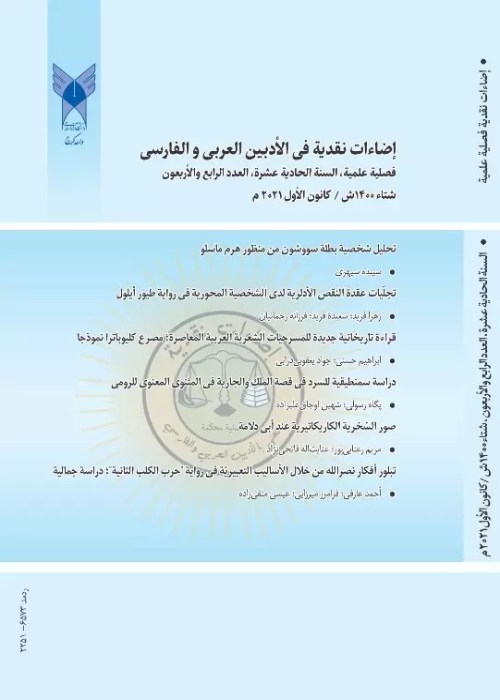A Reading of the Ode Identity Card Qasida (Ode) in the Light of Linguistic Approach
Author(s):
Abstract:
Text linguistics is a modern term referring to the study of linguistic elements of texts. In fact, it is a kind of analysis consisting of various methods and is characterized by its investigation into linguistic elements that are beyond the sentence level as well as the relationship among embedded elements of sentences. The present article attempts at exploring text linguistics. Then, it moves on to tap into this field of science in order to have a certain reading of Mahmoud Darwishs Identity Card. Thus, the article first discusses the concept of text linguistics and the way it has been formed, and then goes on to explore its goals, duties, and linguistic elements. Then, it applies text linguistics in practice and on two bases on the odeIdentity Card; the first basis is interpreting intra-textual coherence based on linguistic contexts and the other is interpreting such a coherence based on non-linguistic elements. The present study reveals that Darwishs ode enjoys a cohesive and coherent framework and that its components are sequentially linked and intertwined with one another. In addition, techniques utilized in the text are thoroughly in line with the fulfillment of its goals. Therefore, the six stages of ode, which are known as the overall foundations, are completely coherent. Additionally, after breaking each of the overall foundations into smaller parts, we can see that the poet has tapped into a variety of linguistic techniques to improve the text development. Furthermore, linguistic data, such as references, omission, transition, and repetition are vividly seen in the text, which further add to Mahmoud Darwishs poetic competency. This study also argues that the component textural elements of the ode Identity Card are properly inter-related and coherent, resulting in the overall unity of the ode. This unity is based on a coherent thought starting with the title, followed by the introduction, and body and ending in the conclusion, encouraging the reader to keep reading the text.
Keywords:
Language:
Arabic
Published:
Rays of Criticism In Arabic & Persian, Volume:7 Issue: 25, 2017
Pages:
119 to 139
magiran.com/p1701329
دانلود و مطالعه متن این مقاله با یکی از روشهای زیر امکان پذیر است:
اشتراک شخصی
با عضویت و پرداخت آنلاین حق اشتراک یکساله به مبلغ 1,390,000ريال میتوانید 70 عنوان مطلب دانلود کنید!
اشتراک سازمانی
به کتابخانه دانشگاه یا محل کار خود پیشنهاد کنید تا اشتراک سازمانی این پایگاه را برای دسترسی نامحدود همه کاربران به متن مطالب تهیه نمایند!
توجه!
- حق عضویت دریافتی صرف حمایت از نشریات عضو و نگهداری، تکمیل و توسعه مگیران میشود.
- پرداخت حق اشتراک و دانلود مقالات اجازه بازنشر آن در سایر رسانههای چاپی و دیجیتال را به کاربر نمیدهد.
In order to view content subscription is required
Personal subscription
Subscribe magiran.com for 70 € euros via PayPal and download 70 articles during a year.
Organization subscription
Please contact us to subscribe your university or library for unlimited access!


